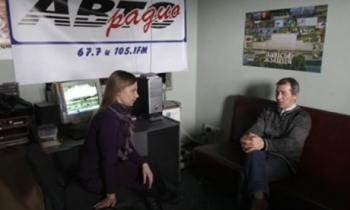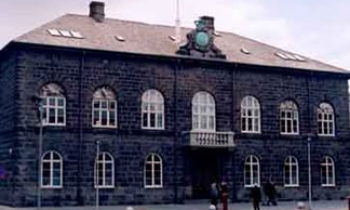The international controversy over Danish caricatures of the Prophet Muhammad reverberated in Toronto yesterday – with hurt and sadness in the mosques and action in grocery stores.
Muslim-owned groceries removed Danish products from their stores, joining a worldwide boycott stemming from publication of the cartoons.
"Value is more important than business," said Hanif Kotwal, store manager at Iqbal's, a large supermarket in Toronto's Thorncliffe Park, home to the city's largest concentration of Muslims. "Even if it hurts our business, we have to show solidarity."
Muslims in much of the Arab world have reacted to the cartoons – first published last September in the Copenhagen daily Jyllands-Posten and reprinted since in papers across Europe – with violent protests and threats of kidnapping and boycotts. But hurt and sadness, rather than outrage and anger, have characterized Canadian Muslims' reaction to the cartoons, said Javed Akbar, director of outreach at the Pickering Islamic Centre.
"Every time his name is invoked, out of sheer respect and affection, Muslims also say, `Peace be upon him,'" said Akbar. "There is a profound sense of reverence and affection toward the Prophet, which is an integral part of faith. That's what other people do not understand."
At Iqbal's, Kotwal posted signs reading, "We don't carry products from Denmark." Employees checked various items to see where they came from.
Customers backed the store's stand, which has seen items such as cookies and deep-fried onions taken off the shelves.
"I'd rather fry (onions) myself than buy their stuff," said Masood Hadi, who visits Iqbal's four or five times a week to shop for groceries.
Other Halal stores contacted by the Star said they did not carry imported products, so had nothing to boycott.
Turkish grocery store Tahsin Market, on Danforth Ave., decided to stop ordering cheese products from the Danish-based company, Arla Foods, after seeing reports of protests earlier this week.
"I am not a fanatic and the issue here is not money," said owner Mehmet Solmaz. "It's about the respect of one's beliefs."
He said he was hurt to see Denmark, which champions human rights, as the setting for a controversy that's so insulting to his religion.
Akbar of Pickering said that while Islamic interpretations of the Qur'an differ as to whether any depiction of Muhammad is blasphemous, few Muslims would disagree the cartoons in question were insulting. One depicts a bomb in Muhammad's turban. In another, he says he's run out of virgins for suicide bombers.
"It is a slander. It is not a mere cartoon for humour. It is going far beyond that," Akbar said.
In Washington, the U.S. State Department stepped into the fray yesterday, backing Muslims against the European newspapers.
"These cartoons are indeed offensive to the belief of Muslims," State Department spokesman Kurtis Cooper said in answer to a question. "We all fully recognize and respect freedom of the press and expression but it must be coupled with press responsibility. Inciting religious or ethnic hatreds in this manner is not acceptable."
The U.S. stopped short of urging American media not to republish the cartoons, however.
Ruth Mas, a lecturer in Islamic studies at Wilfrid Laurier University, said the blasphemy in this case stems not simply from the act of depicting Muhammad, but from the "awful" depictions of Muhammad in the cartoons.
"The issue of blasphemy comes in with disrespect," she said. "You cannot uncouple the issue."
Still, Akbar said, Canadian Muslims are much less likely to take to the streets in protest.
"This thing would not happen in Canada," he said. "Canada is a great success story of justice and tolerance."
The Canadian Arab Federation, a non-religious organization, condemned the cartoons as hateful propaganda that does nothing to bridge the gap between the Muslim world and Western nations.
"Arabs and Muslims understand the freedom of expression," said Mohamed Boudjenane, executive director of the federation. "But it has limits. You cannot use it to incite hatred and racism against other groups."
The Islamic Supreme Council of Canada in Calgary yesterday called on the Danish government to apologize to Muslims.
For Akbar, the hurt stems from Jyllands-Posten's decision to publish the cartoons last September after being told they would be offensive to Muslims.
"Why would they do that?" Akbar asked. "That's what I can't understand."
Jyllands-Posten apologized yesterday in an editorial, something the paper refused to do months earlier.
"If we had known that it would end with death threats and that Danish lives could actually be put at risk, we would have naturally not have printed the drawings," the paper said.
Such efforts failed to slow the mounting anger in the Middle East, where imams spoke out during Friday prayers.
"We will not accept less than severing the heads of those responsible," one preacher told worshippers at the al-Omari Mosque in the Gaza Strip.
In several Gulf Arab countries, shops and supermarkets dumped Danish products as text messages circulated urging the faithful to boycott Danish food "in the name of Islam."
"We must tell Europeans, we can live without you. But you cannot live without us," prominent Muslim cleric Sheikh Youssef al-Qaradawi told worshippers in Qatar. "We can buy from China, Japan, Thailand, Malaysia ... we will not be humiliated."
In Lebanon, thousands of Palestinian refugees marched through the streets of their camps, burning Danish and Norwegian flags and calling on Osama bin Laden, the Al Qaeda leader, to avenge the Prophet Muhammad.
"We will not be satisfied with protests. The solution is the slaughter of those who harmed Islam and the Prophet," said Sheikh Abu Sharif, spokesman for the militant Osbet al-Ansar group, at a rally in Lebanon's largest camp, the southern Ein al-Hilweh.
The protests spread to London yesterday, with about 500 demonstrators chanting "Kill, kill Denmark!" and burning that country's flag as they passed the Danish embassy in a march from Regent's Park mosque.
"There are no apologies ... Those responsible would have to be killed," said Abu Ibraheem, 26, from Luton.
Akbar said he doubted the cartoons would get more than a passing mention at prayers in Canada, saying imams here would want to steer away from the topic, for fear of being associated with the protests of the Middle East.
"Privately, they are sharing the same anger, frustration and sadness about it," he said.









